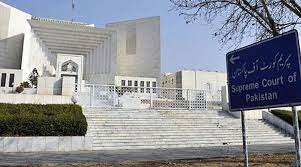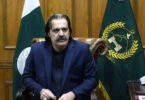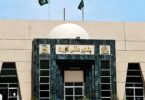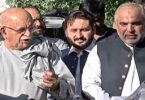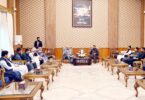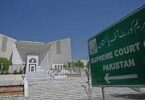F.P. Report
ISLAMABAD: The Supreme Court Friday ordered the government to ensure the conduct of general elections on February 8, a day after President Arif Alvi and Chief Election Commissioner Sikandar Sultan Raja unanimously agreed on the aforementioned date during a meeting held at the President’s House.
The court’s orders came during the hearing of multiple pleas seeking timely elections within 90 days of the dissolution of the assemblies. A three-member bench headed by CJP Isa and comprising Justice Athar Minallah and Justice Amin-Ud-Din Khan heard the case.
The court, in its order, mentioned that the notification of the general election date has also been issued by the Election Commission of Pakistan (ECP), stating that no party has any objection to holding elections on February 8. Chief Justice of Pakistan Qazi Faez Isa asked everyone in the courtroom as well as the Attorney-General for Pakistan, Mansoor Usman Awan, if they had any objection to the election date, but all replied in the negative.
“After all the requirements are fulfilled, the Election Commission should announce the election schedule,” CJP Isa said. The chief justice said: “Elections will definitely be held on February 8, God willing.” After dictating the order, the chief justice said the media would be guilty of violating the Constitution if it created doubts about the elections.
“If a channel runs a ticker casting doubts on the conduct of elections, then there will be action. The ECP will file a complaint to the regulatory body if any media house creates confusion regarding polls,” CJP Isa said. “If there is doubt in anyone’s mind, let it be, but do not influence the public,” he ordered. CJP Isa said he hoped elections would be peaceful without parties insulting their opponents and disposed of the petitions.
Earlier, the AGP told the court that the president had given the date following his meeting with CEC Raja and a notification in this regard has also been issued. “If everyone is happy, then we have no objection. The Election Commission and all the parties have agreed,” the chief justice said, adding that all the members unanimously agreed to the date but did not refer to any constitutional provision. In the order, the chief justice also inserted Article 48 Clause 5 and Section 57 (1) of the Election Act.
The Supreme Court mentioned that the ECP did not respond to the president’s letter. “Every institution including the ECP and the president is bound to implement the Constitution. There are severe consequences for not following the Constitution,” the order read. The court said that the issue of elections was to be resolved between the president and the ECP, which was unnecessarily brought to the Supreme Court.
“If the president needed advice, he could have approached the Supreme Court under Article 187. Several petitions were filed that’s why the court heard the case,” it stated. The order read that the apex court is fully aware of the constitutional limitations, but mentioned that the entire country was worried because elections were not being announced.
The court said it has not interfered with the powers of constitutional institutions like the ECP or the president. “Every constitutional institution must abide by the Constitution. No constitutional body has the option to deviate from the Constitution,” the order read, adding that the court has only played the role of a facilitator between the president and the commission.
The Supreme Court, in its order, also declared that the president and the ECP must remain in their jurisdictions. “Being the highest constitutional post, the responsibility of the president is greater,” the court stated, adding that no institution can claim to be ignorant of the Constitution.
“The consequences of every constitutional violation are serious and far-reaching. The effects of which are felt even today,” the order highlighted. Every constitutional violation, the order stated, has serious effects not only on the people of Pakistan but also on the region. “Courts have also been entangled in unnecessary matters.” Referring to the ouster of PTI Chairman Imran Khan, the court highlighted the significance of the Constitution.
It said that a prime minister was removed by a no-confidence motion in the recent past. “The Constitution is clear that the majority of the members of the assembly can pass the motion of no confidence.” The order mentioned that a political crisis arose in the country after the no-confidence motion after which the SC took its notice.
“The president dissolved the National Assembly after the no trust was tabled, which was an unconstitutional act,” the order read, highlighting that the president cannot do so on the instructions of the prime minister.
“People cannot be kept away from elected representatives,” the order mentioned. The court stated: “Dissolving the assembly unconstitutionally falls under the category of treason. Constitutional institutions can make important decisions only in the interest of the people.” It expressed hope that all constitutional institutions will show prudence in the future.
The order mentioned that the president did not have the power to dissolve the assembly but he did, while he did not exercise his power to appoint a date for election. Furthermore, the chief justice asked the ECP counsel if the electoral authority had issued an election programme. “The election programme will be announced after the delimitation of constituencies is done,” the lawyer replied.
He added that the delimitation process will be completed on November 30, while the programme will be announced in the first week of December. The date of the election schedule should be issued for people to stay updated, the chief justice said. During the hearing on Friday, which was held in two phases, the chief justice asked the Attorney-General for Pakistan, Mansoor Usman Awan, to get the president’s signature on the minutes of the meeting held with CEC Raja, as the minutes he filed earlier did not bear the president’s signature.
Awan, following the temporary adjournment of the hearing, filed the signed meeting minutes at the court along with three copies as well. The Supreme Court, however, kept the original signed meeting minutes. The CJP had earlier said that the court didn’t want any kind of suspicion in the matter, as it did not receive anything from the President House. The chief justice insisted that the court doesn’t want to leave any “grey area” and there shouldn’t be any “ambiguity” in this regard.
“Tomorrow, no party should say that they were not involved in the consultation process. If anyone wants to come from the President House, we will welcome him,” the chief justice said. On Thursday, CJP Isa ordered the ECP to consult President Alvi on the matter of finalising the election date and inform the court.
Following the SC’s directives, CEC Sikandar Sultan Raja called on the president and unanimously agreed to hold general elections in the country on February 8, 2024. It should be noted that the pleas pertaining to the timely conduct of polls were filed by the Supreme Court Bar Association, Pakistan Tehreek-e-Insaf (PTI) and others.

